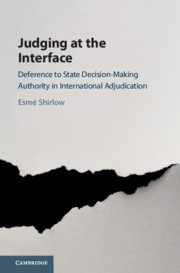Book contents
- Judging at the Interface
- Judging at the Interface
- Copyright page
- Dedication
- Contents
- Figures
- Tables
- Foreword by Judge James Crawford
- Acknowledgements
- Table of Cases
- Table of Treaties, Resolutions, and Declarations
- Abbreviations
- Introduction Deference and the International Adjudication of Private Property Disputes
- Part I Conceptual Framework and Methodological Approach
- Part II Deference in the International Adjudication of Private Property Disputes
- Part III The Systemic Role of Deference in International Law
- 8 Deference in Different Times and Contexts
- 9 The Systemic Implications of Deference in International Adjudication
- 10 Bringing Principles into Practice: Grappling with Deference in International Adjudication
- Conclusion Deference as a Story of International Law and Adjudication
- Appendix Data Tables
- References
- Index
9 - The Systemic Implications of Deference in International Adjudication
from Part III - The Systemic Role of Deference in International Law
Published online by Cambridge University Press: 24 February 2021
- Judging at the Interface
- Judging at the Interface
- Copyright page
- Dedication
- Contents
- Figures
- Tables
- Foreword by Judge James Crawford
- Acknowledgements
- Table of Cases
- Table of Treaties, Resolutions, and Declarations
- Abbreviations
- Introduction Deference and the International Adjudication of Private Property Disputes
- Part I Conceptual Framework and Methodological Approach
- Part II Deference in the International Adjudication of Private Property Disputes
- Part III The Systemic Role of Deference in International Law
- 8 Deference in Different Times and Contexts
- 9 The Systemic Implications of Deference in International Adjudication
- 10 Bringing Principles into Practice: Grappling with Deference in International Adjudication
- Conclusion Deference as a Story of International Law and Adjudication
- Appendix Data Tables
- References
- Index
Summary
This Chapter investigates the systemic role and implications of deference in international adjudication. It argues that existing analyses of international adjudicative deference have been based upon, without explicitly acknowledging, an assumed relationship between the domestic and international legal orders. The Chapter proposes inverting the enquiry. Instead of starting from an assumption as to how deference should be structured, it argues that approaches to deference can instead be analysed and conceptually distinguished by reference to how they structure the relationships between the international and domestic legal orders. The Chapter demonstrates that the three conceptualisations of authority underlying the seven modes of deference introduced intoreflect distinct approaches to structuring the relationship between the international and domestic legal orders. Conclusive approaches disclose a monist view of that relationship, whilst suspensive approaches reflect dualist structures, and concurrent approaches reveal pluralist paradigms. This analysis brings into focus the structural and systemic functions of deference in international adjudication.
Keywords
- Type
- Chapter
- Information
- Judging at the InterfaceDeference to State Decision-Making Authority in International Adjudication, pp. 221 - 238Publisher: Cambridge University PressPrint publication year: 2021

